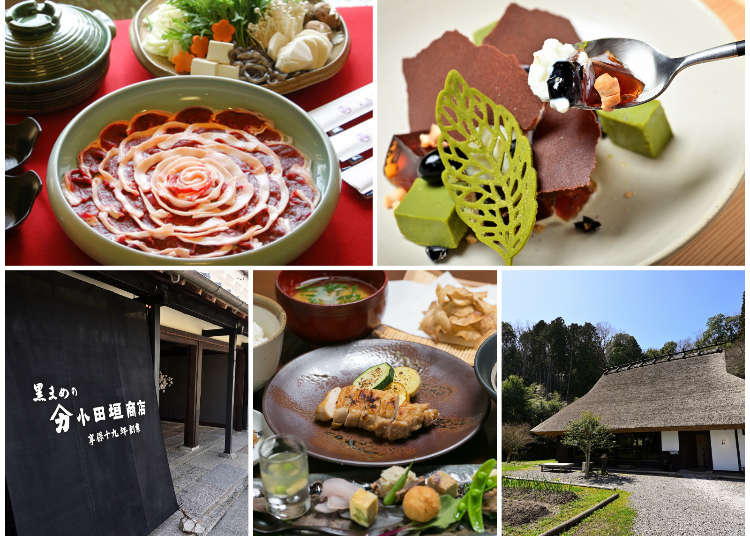
4 Restaurants to Enjoy in Tamba-Sasayama: Kuromame Sweets, Botan-Nabe & More
- Written by: WESTPLAN
Nestled within the central-eastern part of Hyogo Prefecture, Tamba-Sasayama is a tranquil town steeped in samurai history. This article showcases four outstanding restaurants, where visitors can savor the region's distinctive produce, from Tamba-Sasayama's coveted rice and vegetables to local specialties like Kuromame sweets and Botan-Nabe.
Easily accessible within a 70-minute train ride from Osaka, this mountain-framed town presents a culinary exploration amidst preserved samurai-era scenery.
- Table of Contents
Tamba-Sasayama’s Local Specialties
Spring and summer offer their respective seasonal vegetables, while autumn is known for its black beans, chestnuts, and mountain potatoes. And in winter, people enjoy botan-nabe, a type of hotpot dish.
And now, we will introduce a selection of recommended Tamba Sasayama delicacies that you can enjoy all throughout the year.
Kuromame and Kuro-edamame
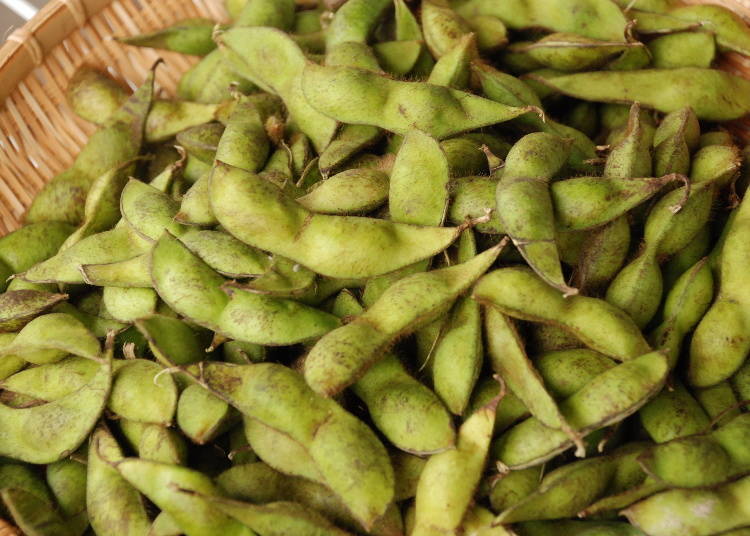
Nestled in a basin surrounded by mountains, Tamba-Sasayama has the perfect climate for growing abundant crops, characterized by extreme temperature differences between day and night. The region is known for its specialty, Kuro-edamame, or black edamame.
‘Edamame’ typically refers to young soybeans harvested before ripe. Fully ripe edamame becomes soybeans. Kuro-edamame, however, is a different variety of soybean that becomes black when fully mature. Kuro-edamame is notably larger than traditional edamame, with a more intense flavor.
October marks the beginning of kuro-edamame season in Tamba-Sasayama, in which stalls are set up throughout town for a two-week period for people to sell their edamame harvests, still attached to the branches. As one of Tamba-Sasayama’s beloved autumn traditions, this period attracts countless visitors to the area on sightseeing buses. The black edamame berries are large in size, and boast an amazingly sweet and savory flavor when boiled and lightly salted.
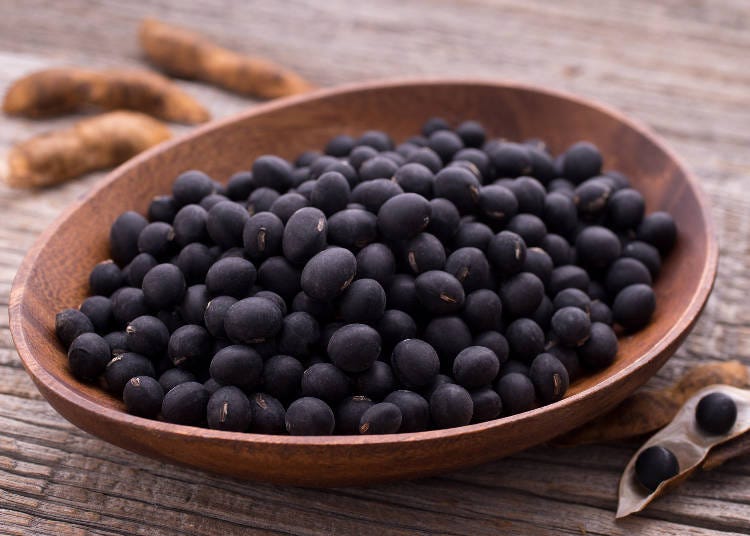
Dried kuro-edamame is a staple of Japanese New Year's dishes. They come from black soybeans left to dry in the fields without being harvested. You'll find sweet, boiled kuromame sold in jars and vacuum-packed containers, making them excellent souvenir choices.
Kuromame bread is another local treat, kneaded with sweetened black beans and sold year-round in bakeries. If you happen to find any of these treats during your outings, be sure to pick a few up for a snack!
Tamba Chestnuts
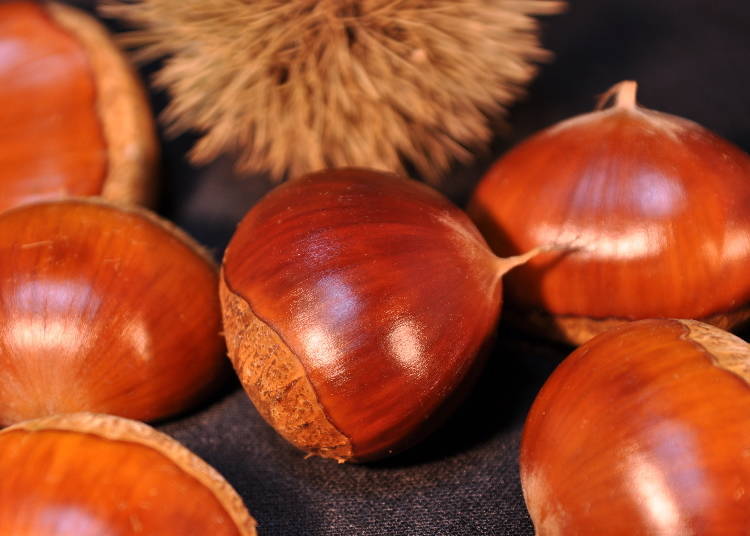
Tanba chestnuts are renowned for being the most expensive chestnuts in Japan. These large, robust chestnuts are harvested in autumn, which families eagerly enjoy together with rice.
Some households also use them in a sweet preserved food known as ‘shibukawani’ (simmered whole chestnuts with the astringent skin intact). You’ll find all kinds of Japanese and Western sweets with chestnuts at confectionery shops, so feel free to indulge!
Yama-no-imo (Mountain Yam)
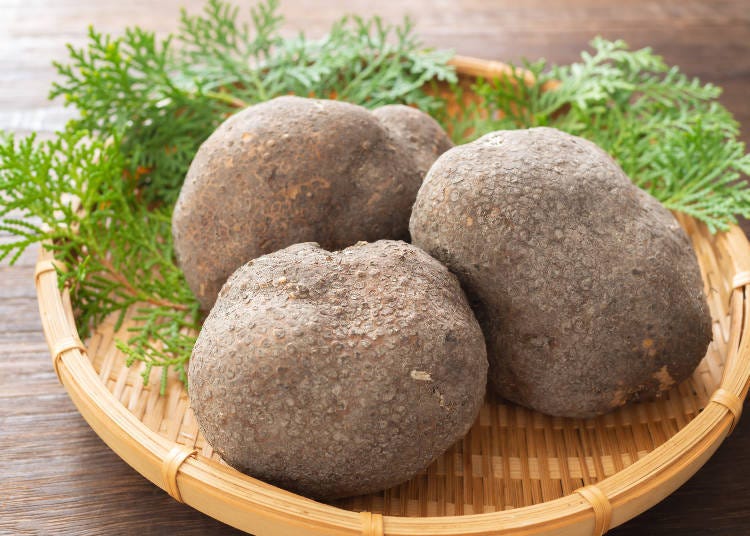
Yama-no-imo (mountain yams) are also known as kiri-imo (fog potatoes). This nickname comes from the fact that they are harvested in the autumn, a time when fog is deep in Tamba-Sasayama.
Mountain yams are characterized by their stickiness, which acts as a binding agent and turns them into dumpling-like balls when grated and put directly into miso soup. Tororo gohan (rice with grated yam) is another delicious dish, made with grated yam and broth, and served over barley rice.
Botan-nabe
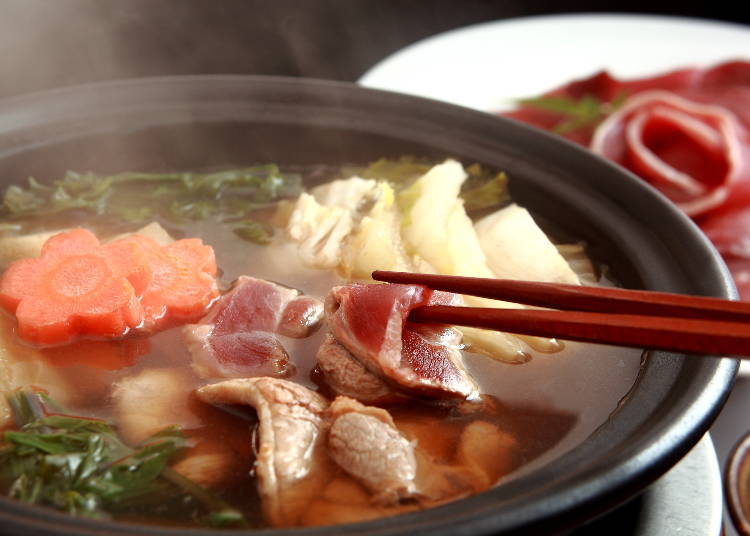
November through March marks the hunting season, a time when hunters venture into the mountains in search of wild boars. The fresh, raw boar meat is then stewed with vegetables in a miso broth to make botan-nabe, a wintertime delicacy. The boar fat lends a distinctive flavor to the meat, which becomes more tender the longer it simmers, further enhancing the flavor of the broth. It’s the perfect comfort food to warm your body on a chilly day!
Now, let’s look at some of the top recommended restaurants and dishes that fully use these unique ingredients.
Recommended Restaurants in Tamba-Sasayama
1. Odagaki Shoten / Odagaki Mamedo: Kuromame Sweets at a Specialty Kuromame Shop
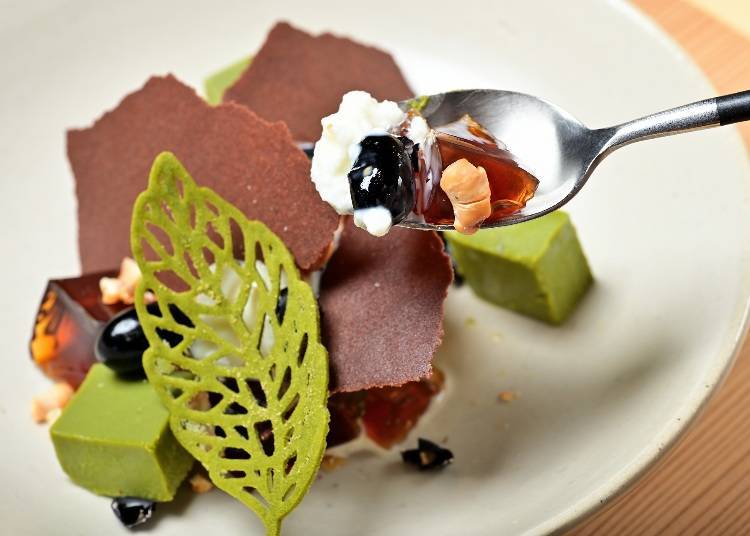
Cafe Odagaki Mamedo, located in Odagaki Shoten, is renowned for its variety of beans, particularly its specialty kuromame. Here, visitors can indulge in delicious lunches and tasty treats, all while gazing out over the stone garden with its wabi-sabi ambiance.
The Coffee Jelly and Tamba-Sasayama Tea Ganache is a sweet treat made with Odagaki blend light-roasted coffee jelly, rich and bittersweet Tamba-Sasayama tea ganache, and a dollop of cooked kuromame. The leaf-shaped Langue de Chat cookie is also made with local Tamba-Sasayama tea and subtly accented with a sprinkle of Asakura sansho (from Yabu City, Hyogo Prefecture).
(*Asakura sansho, a variety of Japanese pepper, may be sourced from other regions depending on the season.)
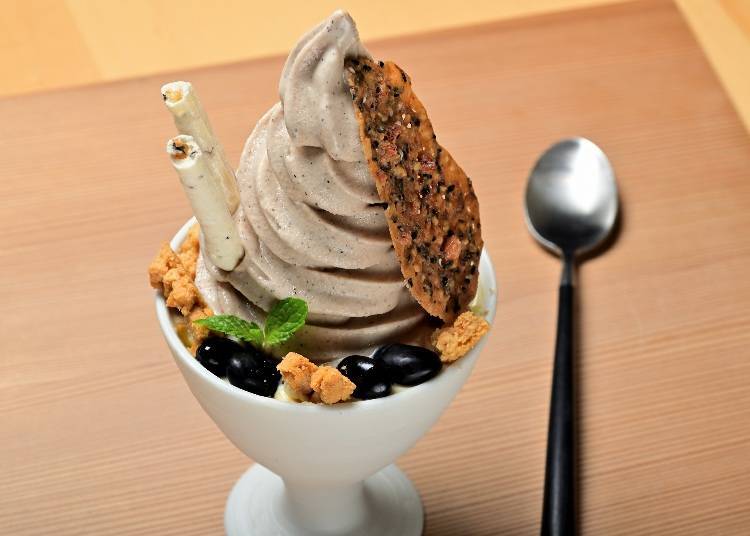
The Kuromame-Kinako Soft-Serve Ice Cream Parfait contains generous amounts of local specialty kuromame. Inside the cup, you’ll find custard and kuromame tea jelly, kuromame kinako Langue de Chat cookies, and roasted kuromame, while on top sits a nice dollop of rich Kuromame Kinako Soft Serve Ice Cream.
It also includes sweet boiled beans, salty steamed kuromame, and roasted kuromame meringue. Despite its unassuming appearance, this classic favorite will surprise you with its generous portion.
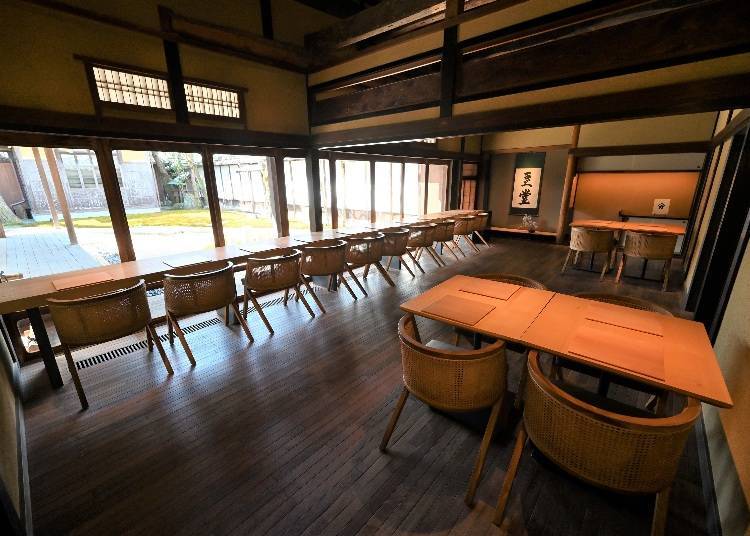
Odagaki Mamedo visitors may also enjoy their treats from the special counter seats overlooking the rock garden outside. The table arrangement provides ample space, creating a wonderfully modern Japanese atmosphere.
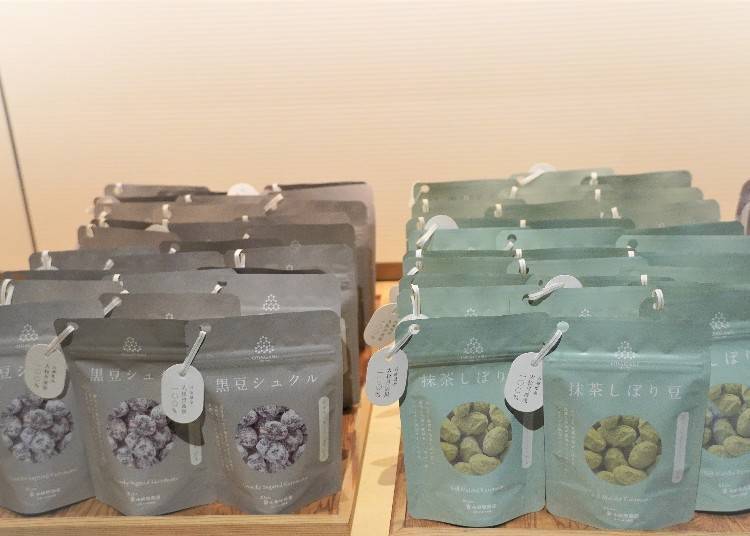
You'll find a superb selection of healthy sweets made from kuromame and azuki beans in the shop. Alongside the classic shiborimame and roasted beans, you'll also find a variety of other flavors, including kuromame chocolate and green tea shiborimame.
Most of these treats come in small packages, making them great souvenir options for those who want to try more than one flavor. Travelers especially love the Zenzai Retort Packs and Kuromame Tea!

They also carry a variety of dried beans, including kuromame, soybeans, azuki beans, and hana-mame (scarlet runner beans). Because of their long shelf life, they also make great souvenirs for long-distance travelers.

Odagaki Shoten is located near the Kawaramachi Tsumairi Merchant Housing District, showcasing beautifully-preserved traditional buildings from the Edo Period.
With a history spanning over 280 years, 10 of the merchant houses on the premises are registered as Tangible Cultural Properties of Japan, five of which are open to the public as shops, galleries, and cafes.
Here, visitors can unwind as they immerse themselves in a nostalgic shop reminiscent of the old days, indulge in kuromame sweets, and buy kuromame snacks as souvenirs. The website, brochures, and menu are all available in English.
-
Odagaki Shoten Main Store / Odagaki Mamedo小田垣商店本店/小田垣豆堂
- Address 19 Tatsumachi, Tambasasayama, Hyogo 669-2323
-
Nearest Station
Access: Take Sasayama Office bound Shinki Bus from JR Sasayamaguchi Station to Kamitatemachi; walk south for 2 min.
- Phone Number 079-552-0011
Cafe Odagaki Mamedo:
- Hours: 11:00 a.m. - 5:00 p.m. (Last order at 4:00 p.m.)
- Closed: Thursdays (following weekday if national holiday), Year-end and New Year holidays
Main Store:
- Hours: 9:30 a.m. - 5:30 p.m.
- Closed: Year-end and New Year holidays only
2. Ryoriya Yamayu: Charcoal-Grilled Dishes and Mountain Yams in an Old Private Residence
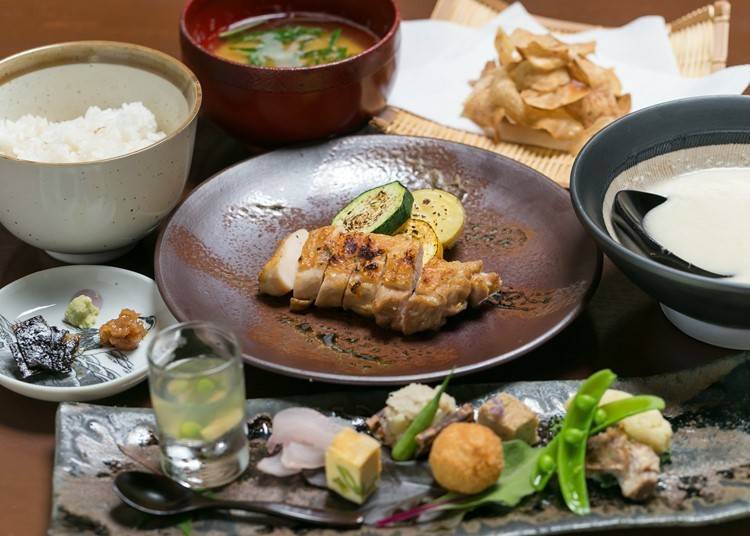
Kannan Isamu Shoten, a wholesaler of Tamba specialties, including mountain yams, directly manages Ryoriya Yamayu. The dishes they serve make full use of these local ingredients, including the yams, as well as chestnuts. We especially recommend the Tamba Jidori Chicken Tororo Set with Seasonal Vegetables.
The first dish is a plate of mountain yam chips, consisting of thinly sliced yams, crisply fried, and sprinkled with sansho salt. The soft, zesty aroma stirs the appetite. The five-flavor, five-vegetable hors d'oeuvres use seasonal vegetables, while the charcoal-grilled dishes include a choice of fish or beef in addition to jidori chicken.
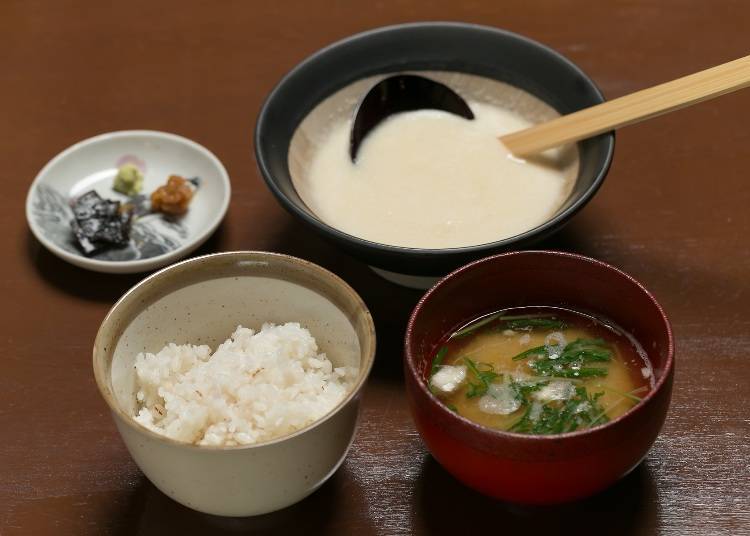
The best part of the Tororo Set Meal is the homemade Tororo Soup. The rice is produced in Tamba-Sasayama under reduced use of agricultural chemicals. It is then cooked together with barley and served with grated mountain yam and broth. Enveloped in a flavorful broth and sticky mountain yam, this delicious dish is bound to satisfy your hunger!

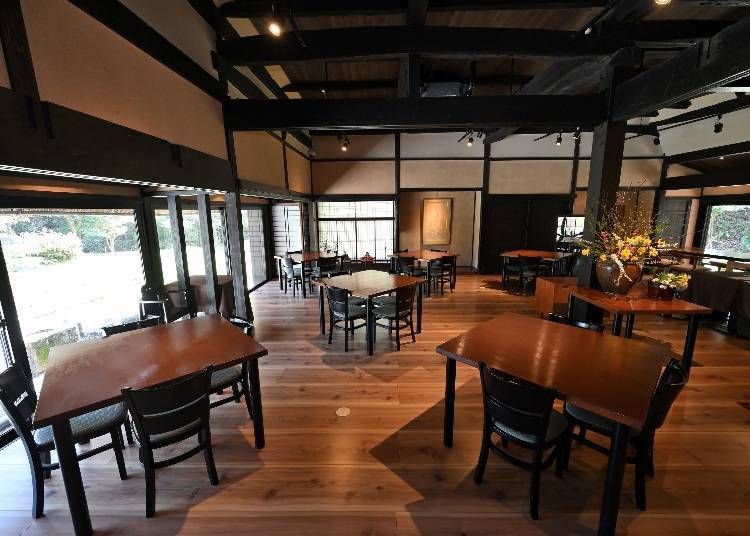
Ryoriya Yamayu is a restaurant inside a renovated 400-year-old private residence with a beautiful thatched roof, recently restored in 2021. Guests must remove their shoes before entering the restaurant, where they are greeted by an alcove furnished with seasonal Japanese decorations. Vegetables from the small field just outside the restaurant are sometimes featured on the menu, allowing diners to savor the seasons for themselves.

Gosechiya Yamayu is another shop on the premises specializing in traditional foods and sweets. The Inarizushi is a hearty dish of thinly sliced fried bean curd filled with broth and sushi rice. Tamba Okowa, a traditional dish served during festivals since ancient times, is prepared in Yamayu style with beans and wild vegetables, wrapped in a bamboo skin, and steamed to aromatic perfection. It is also recommended as a take-out option.

Other sweets made from Tamba chestnuts and kuromame are also on display. Yamayu is about 2 km east of JR Sasayamaguchi Station. You can also get there by renting a bicycle from the Sasayamaguchi East Exit. There are no English menus, but some options have pictures, so you can point them out when ordering.
-
Ryoriya Yamayu五節舎やまゆ
- Address 81 Agake, Tambasasayama-shi, Hyogo 669-2205
- Phone Number 079-590-1261
・Hours:
-Lunch: 11:00 a.m. - 3:00 p.m. (Last order at 3:00 p.m.) *Reservations given priority
-Dinner: 6:00 p.m. - 9:30 p.m. (Last order at 9:30 p.m.) *Reservations required one day in advance
・Closed: Tuesdays (following weekday if national holiday)
3. Katsugyo-kappo Hougyoen: Botan-nabe, A Popular Wintertime Specialty At A Popular Japanese Restaurant
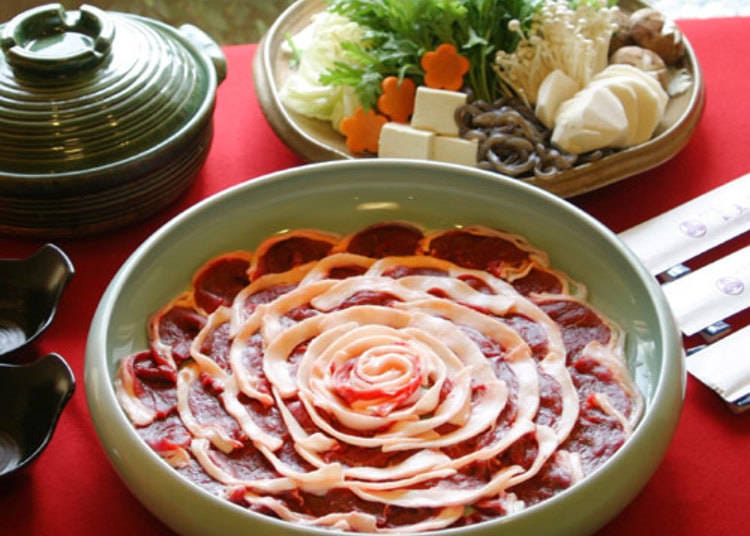
A community-based restaurant, Katsugyo-kappo Hougyoen has been in business for 50 years and is famous for its Botan Nabe. The fresh raw boar meat is cut by hand, and every part is used, including the loin, shoulder, belly, arm, and thighs, allowing diners to appreciate the differences in flavor from one part to the next.
As the meat is stewed, the flavor of the wild boar meat dissolves into the miso broth, enhancing its rich flavor. For the main dish, a raw egg is added to the broth, then served half-cooked over rice. In the winter, customers can enjoy Botan-nabe as well as Fugu (blowfish) and Duck Nabe. (Advanced reservations are required for nabe dishes).
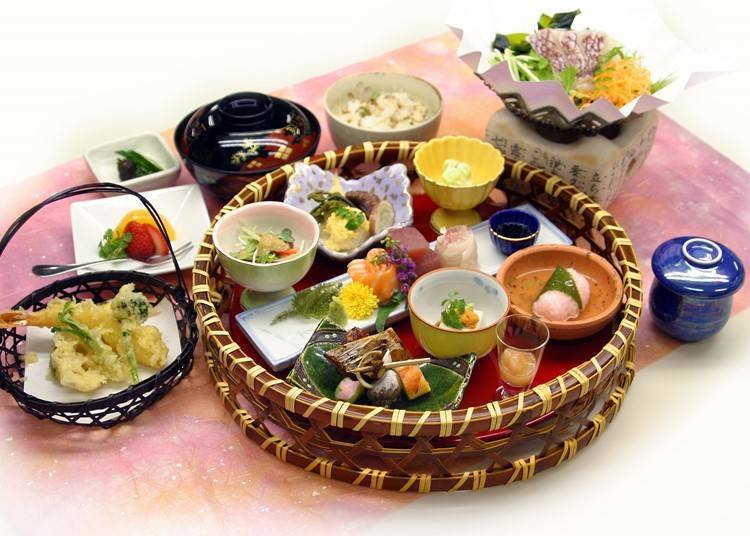
Another recommendation is the Basket Kaiseki, which features seasonal delicacies arranged in small bowls and colorfully presented in a basket. The gorgeous Basket Kaiseki Hana Course includes steamed egg custard, tempura, rice, red miso soup, and dessert.
Most of Hougyoen's vegetables are freshly grown in Tamba-Sasayama, and the fish are delivered each morning from two central markets. This delicious Japanese cuisine consists of carefully-selected ingredients and is expertly prepared by experienced culinary chefs.
(*The Yuki Course includes a small pot or ceramic bowl with flowers.)
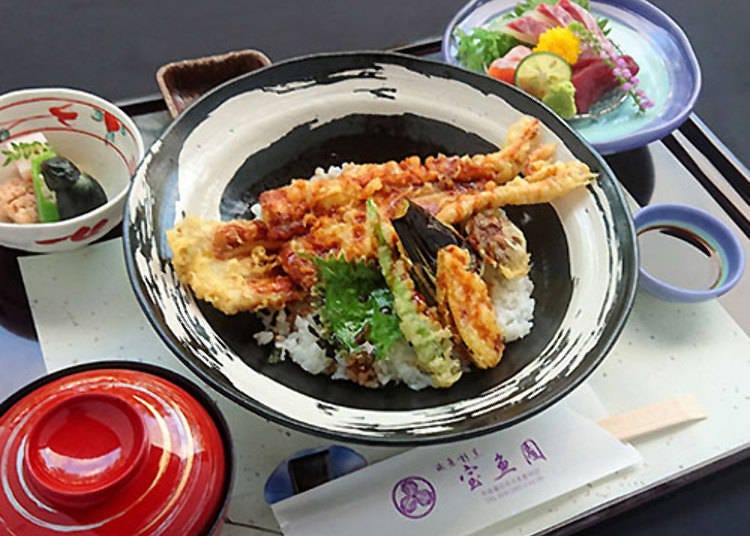
The lunch menu is extensive, and the sweet-and-spicy Steamed Anago Tempura Donburi will surely be a hit! The only rice used in this dish is Koshihikari rice from the restaurant's own farm, which boasts a soft, fluffy texture and delicious flavor. The set includes fresh sashimi, a small cooked side dish, and a soup.
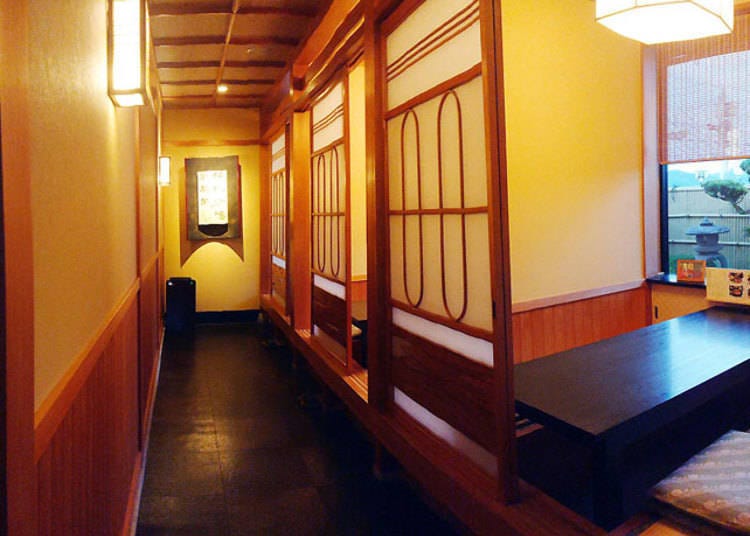

Hougyoen is located about seven minutes by cab northeast of JR Shinoyamaguchi Station. The restaurant is Japanese-style, and all rooms are private. Chairs and sunken kotatsu seats allow you to stretch your legs and enjoy your meal in comfort. Most dishes for both lunch and dinner are also available without reservation.
Reservations may be required for select seasonal dishes. There are no English menus, but the pictures make it easy to point and order.
-
Katsugyo-kappo Hougyoen活魚割烹 宝魚園
- Address 52 Kawagita Shinden, Tambasasayama-shi, Hyogo 669-2725
- Phone Number 079-593-1341
・Hours:
-Lunch: 11:30 a.m. - 2:00 p.m.
-Dinner: 5:00 p.m. - 9:00 p.m.
・Closed: Tuesdays
4. Baikakudo: Artisan-Made Sasayama Tarts At A Long-Established Japanese Confectionary
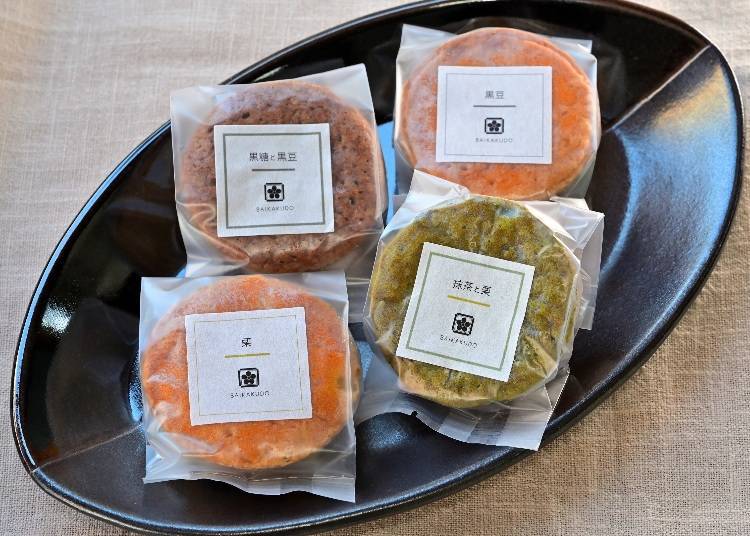
Baikakudo is a long-established Japanese confectionery shop that was the first in Japan to process specialty Tamba black soybeans into amanatto (sweetened soybeans). On display are handmade sweets crafted by skilled artisans, utilizing their expertise and techniques unique to the region where the black soybeans are grown.
In the fall, the shop offers a variety of sweets made with rare Tamba chestnuts. In other seasons, you’ll find a lineup of monaka, manju, and yokan sweets made with Japanese chestnuts. Many of the sweets have long shelf lives, making them suitable souvenirs for those traveling long distances.

Of all the delicious options, we recommend the Sasayama Tart, with its savory almond flavor. In addition to the standard varieties such as chestnut, kuromame, green tea, and kintsuba, there are also seasonal selections. These indulgent tarts are filled with chestnuts and kuromame and enclosed in a pie crust, offering an elegant combination of traditional Japanese treats with a touch of Western flair. These tarts pair well with Japanese tea, coffee, or black tea. They have a shelf life of 30 days.
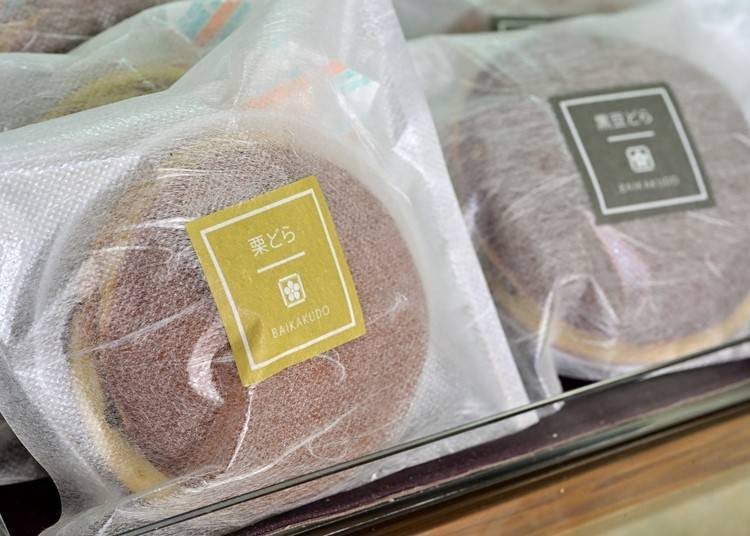
The Dorayaki is one of Baikakudo’s most popular items. The crust is made with rice flour for a soft and chewy texture, sweetened with an ample amount of honey for a truly refined taste. The filling contains whole chestnuts in sweetened soy sauce and tsubu-an (sweet red bean paste) made from high-grade Dainagon azuki beans produced in Tamba. Each pastry is sweet and delicious but light enough to make you want to eat two or three at once!
Seasonal specials include green tea and sakura gyuhi (sticky rice cakes), so be sure to try them if you happen to catch them at the right time. Shelf life is 14 days (some exceptions may apply).

Baikakudo is situated along the shopping street on the east side of Sasayama Castle. It's a short walk from the Kamitate-machi bus stop when taking the Wing Shinki Sasayama Office-bound bus from JR Sasayamaguchi Station.
However, we recommend visiting Sasayama Castle first and exploring the castle town as you go. There are no English signboards, but the staff members are friendly. All you have to do is point out what you want from the display case, and you're good to go!
-
Baikakudo梅角堂
- Address 78-1 Tatsumachi, Tambasasayama-shi, Hyogo 669-2323
- Phone Number 079-552-0267
・Hours: 10:00 a.m. - 6:00 p.m.
・Closed: Thursdays (open if national holiday)
Tamba-Sasayama's tourist season may be autumn, but the town offers delicious delicacies all throughout the year! Visitors may ride the JR Rapid Express train at the standard fare, rather than having to pay an express fare. If traveling from the Osaka area by car, it takes about one hour to the Tannan Sasayamaguchi Interchange via expressway.
In this castle town, delicious restaurants abound. So why not venture out for a bite and indulge in kuromame, chestnuts, and all the other local specialties the area has to offer?
*Information in article as of May 2023. Please see official websites for the latest updates and information.
English translation by: Krys Suzuki
Kiko Matsuda, Keiko Kimura, Risa Tsushi, and a team of female writers familiar with Kansai. We love eating, drinking and traveling! We share fun information based on our experiences.
- Area
- Category
*Prices and options mentioned are subject to change.
*Unless stated otherwise, all prices include tax.
Popular Tours & Activitiess
Recommended places for you
-

Tenku cafe
Other Cafes and Sweets
Umeda, Osaka Station, Kitashinchi
-

GiontamejiroGion
Other Cafes and Sweets
Gion, Kawaramachi, Kiyomizu-dera Temple
-

Yoru Parfait specialty restaurant Parfaiteria PaL Shinsaibashi
Other Cafes and Sweets
Namba, Dotonbori, Shinsaibashi
-
Menu

Gionjaya Tabanenoshi Shinkyogoku
Other Cafes and Sweets
Gion, Kawaramachi, Kiyomizu-dera Temple
-

Crepe-to Espresso-to Horie
Other Cafes and Sweets
Namba, Dotonbori, Shinsaibashi
-

Yoru Parfait specialty restaurant number kuma
Other Cafes and Sweets
Namba, Dotonbori, Shinsaibashi
-
Ad

Earthquake in Kyoto? Typhoon? What To Do If Disaster Strikes During Your Stay
-

A First Look at NEMU RESORT’s 2026 Grand Renewal in Ise-Shima: A Resort Shaped by Village, Sea, and Forest
by: Guest Contributor
-
Ad

Discover Kyoto by the Sea: Explore Nature, History, and Culinary Tradition in "Another Kyoto"
-
Ad

Iseshi Station: Gateway to Japan’s Sacred Heart and the Evolving Ise-Shima Region
-

Vintage Watch Hunting in Osaka (Umeda & Shinsaibashi): Rolex, Seiko, and Rare Finds
-
Ad

4 Recommended Restaurants Open After 9 PM Near JR Nara and Kintetsu Nara Station
by: Shingo Teraoka
-

Sightseeing Highlights: Experience the Appeal of Kyoto Geisha Culture
-

Mahoroba Daibutsu Pudding: Japan's Adorable 'Pudding Theme Park' Will Make You Want to Redecorate
-

Michelin Star Restaurants & More: 3 Best Okonomiyaki Shops in Dotonbori Osaka
-

10 Tasty Kyoto Sweets to Snack On While in Town!
-

3 Best Places for Breakfast in Osaka Umeda
by: WESTPLAN
-

Popular Food at Universal Studios Japan
by: WESTPLAN
- #best gourmet Osaka
- #things to do Osaka
- #what to do in kyoto
- #what to bring to japan
- #best gourmet Kyoto
- #new years in Osaka
- #what to buy in nanba
- #Visiting Osaka
- #onsen tattoo friendly arima
- #daiso
- #Visiting Kyoto
- #best japanese soft drinks
- #japanese fashion culture
- #japanese convenience store snacks
- #japanese nail trends















